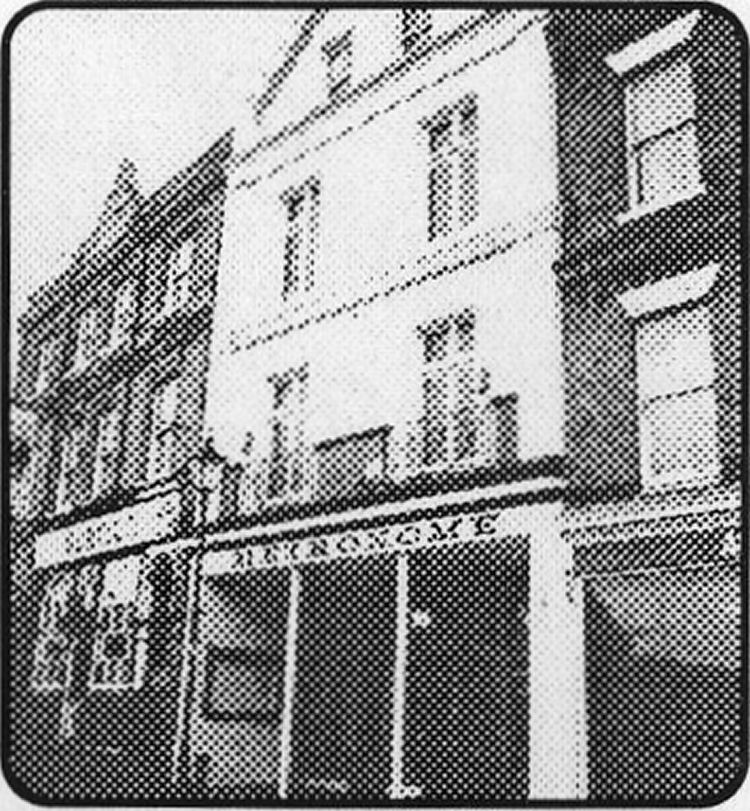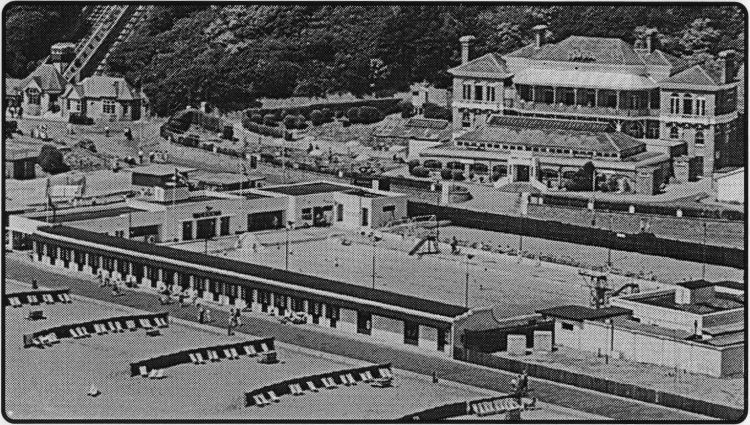
Published 3 July 2003


BELOW: The once popular open-air pool on the seafront with indoor baths
and cliff lifts bringing up the rear, an aerial view dating from around 50
years ago. See Jimmy Godden’s challenge to open-air swim enthusiasts on this
page in our feature “From our Files” for 1978. Pictured right is the
Metronome, previously the Savoy Cinema, see story below.
CINEMA enthusiast Eric ‘Ricky’ Hart, a “Memories” reader keenly interested
in Old Folkestone is disgusted by the state of what used to be the Savoy
Cinema - later the Metronome night spot in Grace Hill, Folkestone.
Ricky has a special interest in the cinema. For one thing he joined forces
with the late Tony Thompson, another local history enthusiast, to put on
record the history of Folkestone’s four main cinemas.
The results of their collaboration featured in an excellent large format
paperback about local cinemas, “Picture Palaces Remembered,” published in
1987 in collaboration with the late John Roy, of River.
Profits from the sale of that attractively presented book, published by
Glenton Publications, were donated to the East Kent Hospice.
But, more personal, Ricky treasures an important ‘relic’ of the Savoy. He
saved the old Standaart cinema organ and somehow grafted it into his home in
Chart Road!
To Ricky it seems criminal that the “Savoy” - later the Metronome - on Grace
Hill, is “languishing in its sad demise and being allowed to rot away.
“A skylight with a loose pane of glass has given access to pigeons, as well
as letting in rain. I recently caught a glimpse of the auditorium from the
rear balcony exit, and was shocked to see how the penetrating damp has
brought down some of the ornate
shame
ceiling plaster, which some years back had been restored at great expense to
the ratepayers of the town and county,” he said.
“At this rate I imagine that it won’t be long before the demolition gang
moves in,” he commented sadly. A sad state of affairs considering its
history.”
June 29, he points out, marked the 74th anniversary of the re-opening of the
Savoy super cinema after the disastrous fire in December 1928.
“This marked the debut of the Standaart organ there and, I’m proud to say it
is still fully functional at home with me.”
‘Stunning shows’
The property was intended to become a music hall, but started as a motor
garage, then became a skating rink and was finally converted into a fully
fledged picture house, or cinema, in 1910, opening on May 3.
Cinematography was then still in its infancy and shows were somewhat
primitive by modern standards, but, says ‘Ricky’ the impact of large screen
viewing, for a full house of some 400 people at “The Electric,” as it was
known, was quite stunning.
Competition came from shows at the Town Hall and the Victoria Pier Pavilion,
where “animated” films were being shown. But it was June 1929 before
seven-day licences were granted. Later more competition came from “The
Playhouse” in
Guildhall Street and “The Central” in George Lane.
The healthy competition saw live shows introduced and there was keen bidding
for the best films on offer.
In 1928 “The Electric” had become the “Savoy,” announcing a ‘scoop’ over the
opposition - “Talking Films” as part of its programme, and proclaimed it was
the first ‘proper’ cinema in Kent!
Sadly, 1928 was not a good year for the owners, the O’Connors, mother and
son, who had a flat over the entrance.
Two months after showing a classic of the time, a feature called “Fire,”
with quite realistic visual and sound effects, there was a real life drama.
Fire broke out at the stage end of the cinema, the flames soon shooting 40ft
into the air. The O’Connors’ maid sounded the
alarm around midday, but soon the cinema was gutted. The rear wall was left
standing, but split from top to bottom.
Happily the property was insured and the new “Savoy” opened only six months
later. A vast improvement on the old, it had seating for nearly a thousand
and, in keeping with a modern trend, a cinema organ was installed, built by
the Dutch firm of Standaart, in Schiedam.
Arriving too early it became quite a crowd-puller stored temporarily in the
former motor showroom of Martin Walter Ltd, in Bouverie Place.
At the time of the fire Ricky was six and recalls earning pennies to pay for
cinema visits, using a cart made from a sugar-box and pram wheels. He helped
neighbours by collecting bushel loads of coke from the gas works for their
winter fires.
Compiled by Bob Hollingsbee
nmnnhinn Humnnstratinn.....■Bar^nn.laimp.hadAmdanj
From Our Files
 |
Drenching demonstration by new steam fire engine!
«| q/%qHYTHE's civic leaders had an impromptu shower when they turned
out for a fiasco of an exhibition given by Hythe and Folkostoiio firemen
to compare tho merits of the town's Merryweather manual firo appliance
of 1866 and Folkestone's modem "George Spurgen" steam fire engine. When
Hythe's old hoses were connected to the steamer they burst, spraying
water over councillors much to the amusement of spectators, but the
demonstration continued, ending cordially with supper - and the
conviction Hythe too, needed a steam erl A new through express train
from Folkestone direct to Liverpool via Reading began running on July 1,
and new direct services between deal, Walmer, Dover, Folkestone,
Sandgate, Hythe, Margate, Ramsgate, Canterbury and Hastings, in July,
August and September. Trains leaving Folkestone at 11.30am were due to
reach Hastings at 1pm, whilo a return 1rain would leave the Sussex town
at 4.32 and return by 5.47pm. Now turbine steamer "The Queen' arrived in
Folkestone to begin services, promis ing an end to soot-covered decks
with a spark' arrester to 'clean' emissions from its engines.
|
Elephants join coronation celebrations on Marsh
«f qfaELEPHANTS, including "Aga." star of 1930tiie film "Elephant Boy,"
and lions used in MGM's "Quo Vadis," wcro set to appear in the
Coronation year Fossett's Circus show at New Romney in the first week of
July as the fifth generation of family owners celebrated 150 years as
touring circus promoters. The RAF rejected criticism of dive-bombing
'attacks’ on Folkestone by USAF and RAF jot fighters, a spokesman saying
that in certain kinds of train ing this could not always be avoided. The
coun try's future safety was paramount. Lyminge Methodists celebrated
the completion of a replacement church to take the place of one
destroyed by one of the enemy's flying bombs in 1944. There was a sad
sequel to a Canterbury Road resident's funeral, the widow of the
deceased collapsing with a heart attack after the ceremony and dying a
few days later. The couple, both born in Dover, were Tom Foreman, 69 and
his wife Nellie (nee Hammond,) who was 73 and the daughter of a Dover
wholesale fruiterer and potato merchant. Tom had been a foreman
bricklayer and was keenly interested in football and cricket. The couplo
moved to Folkestone in 1914.
|
Parson launched Sunday cricket bowling first bali
■1 QOQBY voto t,le Town Council nave .LJ/^Othe go-ahead for tennis on
Sundays, which was good news for those on lower incomes. Sunday golf had
been .i fact of life for years simply because it was the well to clo who
enjoyed the sport and also contributed to the expenses of the Church.
Herald writer Felix wrote of the hypocrisy of those who opposed Sunday
tennis whilo turning a blind eye to golf. Although respecting the Lord's
Day. Felix said Sunday cricket featured in the book "Life of the Rev
Thomas Wilson," back in 1672. George Swinnoche wrote of a tradition in a
Kent village (Frittenden?) where the parson would open the cricket
season, bowling the first ball on Easter Sunday, wearing his wnite
surplice. Many local people feared a near monopoly gained by the East
Kent Road Car Company, meant higher fares for public bus services than
when there were several companies in opposition. Meanwhile there was a
move to ban Soviet produced petrol in Shepway, but the town clerk, told
some coun cils had imposed a ban, said a ban couldn't be enforced under
British law. What councils could do was opt not to use it in their
vehicles!
|
Dormobile works sheds 55 jobs as orders drop
Hi Q"7Q MARTIN Walter company Dormobile X«7 I Oshed 55 staff because, it
said, of a general reduction in demand for the coachbuiid-ing
conversions it curried out. There had "even been a falling off in sales
of its caravans in France," because of the falling value of the Franc.
Spokesman Bob Baker, director and general manager, said the company was
trying not to force redundancies and was looking for voluntary
redundancies. Amusements boss Jimmy Godden challenged the public to
prove it still wanted the open air swimming pool kept going by using it
more, enabling it to pay its way, as he took it over and work began
cleaning the pool ready for use. It's future was in the hands of the
public, he said. Council plans for a skateboard park elsewhere seemed to
rule out the use of the pool site for that purpose. One councillor
suggested that if Mr Godden was willing to renovate the pool and its
facilities and this didn't persuade enough people to use it, the council
should consider a grant to help keep it open. The Sports Centre, he
pointed out got a £60,000 a year subsidy. The editor wrote that a
seaside resort without an outdoor pool was like a World Cup goalkeeper
with only one arm. |
|



